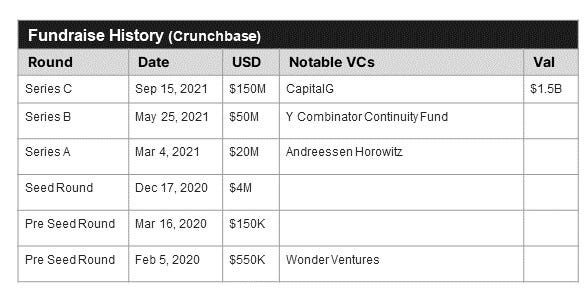Teardown | Whatnot
Founded in 2019, Whatnot has raised over $220M to bring the livestreaming shopping phenomena from the East to the West
Subscribe to get our Teardowns profiling the fastest-growing companies across the eCommerce and retail landscape.
Teardowns profile the fastest-growing companies across the eCommerce & Retail landscape. Subscribe now to join 2,000+ operators & investors leveraging these to stay updated on the latest emerging themes and opportunities.
Snapshot
Founded in 2019, Whatnot is a live streaming shopping platform that lets buyers and sellers interact to exchange collectibles like Pokemon cards and Funko pops. The company has a vast catalog of products split into more than 50 categories involving trading cards, clothing, and collectibles. Sellers are provided tools to interact with customers through live shows, host auctions with a proper bidding process, and offer giveaways.
Headquartered in California, US, Whatnot has raised $224.7M in funds. Its latest funding round was held in September 2021 and brought the company’s valuation to $1.5B. The company is backed by investors like Y Combinator, Animal Capital, L2 Ventures, Operator, and more.
About Whatnot: Website, LinkedIn
Business Overview and Products
The company originally began with collectibles like FunkoPops and Pokemon Cards, but now offers over 50 categories of items. The online marketplace now offers regular categories such as sneakers and streetwear, watches and videogames, along with collectibles like NFTs and trading card games. The extensive catalog of products being bought and sold on the platform includes:
Trading card games
Sports
Toys
Comics and Manga
Sneakers and Streetwear
Vintage and Thrift
Bags, Jewelry, and Accessories
Watches
Video Games and Movies
NFTs
Additional categories such as vinyl records, crystals, gems, and coins
The company also offers dedicated support staff to help both sellers and buyers ensure all transactions are safe and in unlikely cases, are available for helping both parties deal with any issues they may have with the order.
How It Works
Whatnot has a livestreaming platform that allows fan communities to interact with each other to buy and sell verified rare products like Pokemon cards and Funko Pops. The company relies on the ever-growing popularity of the live-shopping trend in the US to attract customers.
The platform verifies streamers that, once approved, can go on-air at any time to host online video auctions for their goods. Every seller goes through a standard procedure for participating on the platform. The standard criteria for a seller to be approved are to have a good social following and a history of selling, after which the seller gets access to the community.
Once approved, sellers can start chatting and interacting with the followers, or selling products through live auctions. The seller sets a starting price and time limit for the item they would like to sell and the buyers start bidding through a click button the app offers. In case the seller does not want to auction their product, they can simply make their item available as a “Buy it Now” product and users may purchase it at any time throughout the seller show. Sellers can also offer giveaway features where viewers can be randomized and the seller can give away any product of their choosing.
Finally, Whatnot offers prepaid shipping labels to sellers through their seller dashboards on the company app. When shipping the sold items, these are simply attached to the shipment which is dispatched via USPS or Canada Post within a fixed number of days. Once the buyer has received their package, payment is received by the seller in 48-72 hours initially in the form of Whatnot credit in their account. The seller can then cash out this credit via Paypal or direct deposit to the seller's bank account.
Business Model and Pricing
The company charges sellers through a fixed fee structure, the breakdown of which is as follows:
8% commission is charged on the selling price of any item once a sale is finalized
2.9%+0.30 cents are charged as a payment processing fee for the entire transaction
This payment processing fee is applied to the subtotal, tax, and the shipping price that a buyer pays for any order
This fee is not applied to any international shipping or taxes
In a Forbes article reporting their Series B, co-founder Grant shared that the platform enables sales of millions of dollars in sports cards per month. The 8% cut the company takes was reported to make them an average of $40 per item and can range from $1 to as much as $20,000.
Traction
Specific traction metrics haven’t been shared by the company but some of the data points shared over the years include:
The sale of sports cards form a major portion of the company’s business. This segment was reported to have grown 80x in 2021.
Overall the company reported 60x growth over 2021.
The company currently offers products across 50+ categories and in March 2021 shared they will be expanding to cover 100+.
In September 2021, the company shared that there were about thousands of active sellers on the platform and the GMV was up 30x since the Series A fundraising round it raised in March ‘21.
The company has hundreds of thousands of users on its platform and thousands of sellers.
Founder(s)
Grant LaFontaine: Co-founder and CEO. Prior to Whatnot, Grant worked as a Product Manager AR/VR at Facebook. He also co-founded Kit.com.
Logan Head: Co-founder and CTO. Prior to Whatnot, he worked as Senior Product Manager at GOAT and Director of Engineering at Flight Club.
History and Evolution
2019: In December, Grant LaFontaine and Logan Head cofounded Whatnot which initially served as a simple marketplace for the buying and selling of sneakers. Later, the company added buying and reselling Funko Pops to its catalog.
2020: By February, the company was fully focused on verifying the authenticity of Funko Pops as they blew up on its platform, using human experts as well as a database of red flags to weed out fake products. The company also shared its plans to expand into Pokemon Cards as a category. When the pandemic struck, the company changed gears and also began focusing on live shopping, banking on the newly imposed quarantines keeping people homebound. At this point in time, live stream shopping had become widely popular in China and was also becoming a rapid sensation within the US, with a large chunk of the live streams being hosted on Instagram. As Instagram was not wired to handle bidding or payments after sales, Whatnot swooped upon the gap in the market and began building out their live shopping platform.
2021: In January, the company introduced sports cards which rapidly sold on the platform and eventually became the largest, best-selling category for the company. By March, co-founder Grant shared that “95%” of the team’s focus is on the live stream side of things.” In September, the company earned a unicorn status, after being valued at $1.5B post a fundraising round of $150M. During this time it was also working on its pre-bidding feature, which would allow interested buyers to bid on an item before the actual live stream happened. It was also working on completely revamping both its iOS and Android apps, to make the UI more efficient for both buyers and sellers.
2022: In January, Whatnot introduced NFTs to its platform formally. In February, the company acquired Pastel Labs, a move that would help it scale the seller side of its platform. In March the company shared its plans to double down on the investments it was making for NFTs on its platform. Currently, the company primarily focuses on the WAX blockchain, due to its user base of collectors.
Market Snapshot
Livestream shopping, a concept rapidly gaining traction in the US, has already made a big market in China. A March 2021 source reveals the sizable market in China amounted to $150B at that point in time. It is expected to reach $423B by 2022.
The small market in the US that caters to live commerce across all apps is expected to grow. It is projected that the live stream retail sector will grow to $11B by the end of 2021 and grow to $25B by 2023.
Several traditional companies, as well as startups, have been attempting to capitalize on this market in the US as of late, but few have been able to foster a live stream shopping community such as Whatnot has, or so legitimate sources reveal. Better yet, they are able to get users to stay engaged on the platform.
According to SensorTower, Whatnot came out to be the most downloaded live commerce app in the US during the period between January and September 2021. It won against competitors like NTWRK and West Chester, who were winners of the same category in 2020. Moreover, Whatnot surpassed its own installations in 2021 from those in 2020 by 21 times.
Suggested Next Reads
Ebay 2.0? Whatnot’s $50M bid to take auction excitement to livestream video (Dot.la, May ‘21)
Whatnot Raises $150M Series C to Become the Premier Live Shopping Destination for Collectors and Enthusiasts of Nearly Any Category (PRNewswire, September ‘21)
Whatnot Livestreams Its Way to Building a Successful Online Marketplace (LABusinessJournal, November ‘21)
Whatnot: The Hobby Community That’s Doing it Live (Boardroom, April ‘22)












